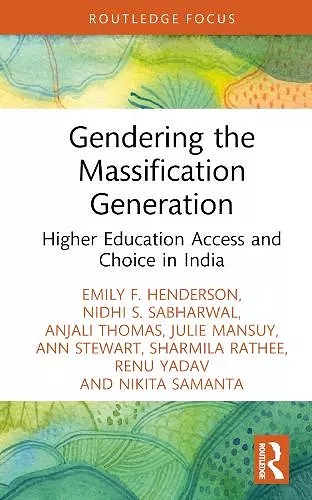Gendering the Massification Generation
Higher Education Access and Choice in India
Emily F Henderson author Nidhi S Sabharwal author Ann Stewart author Anjali Thomas author Julie Mansuy author Sharmila Rathee author Renu Yadav author Nikita Samanta author
Format:Hardback
Publisher:Taylor & Francis Ltd
Published:29th Dec '23
Currently unavailable, and unfortunately no date known when it will be back
This hardback is available in another edition too:
- Paperback£19.99(9781032363011)

Gendering the Massification Generation examines why young people from the same families and communities in India experience different decision-making processes regarding higher education access because of their gender. In India and other contexts where higher education is massifying, and gender parity of enrolment has been reached at undergraduate level, there are still many questions to be asked about gender and access to higher education. Based on an exploratory study of gendered higher education access and choice within the state of Haryana, India, the authors explore gender inequalities of higher education access and choice in the Indian context and connect this with the broader international phenomenon of widening participation.
Through an in-depth analysis of the ‘massification generation’, where young people from relatively disadvantaged backgrounds are accessing higher education, often for the first time in their families and communities, readers are encouraged to apply a lens of social disadvantage and gender, and to recognise the norms and transgressions of femininity and masculinity in relation to higher education access and choice.
With global implications for the ways in which gender is analysed and framed in widening participation research and policy, this is the ideal book for scholars, students and policy makers working on higher education, as well as researchers and NGOs specialising in gender, school-to-higher education transitions, international development, sociology and area studies.
'This internationally co-authored book is such a valuable contribution to knowledge about gender in India’s massive and massified higher education system. The book provides a sophisticated analysis of dominant codes of femininity and masculinity and explores the micro-level aspects of decision-making processes involved in access and participation in higher education in a rapidly changing and complex socio-cultural context. The focus moves beyond representational parity and examines the influence of social class, caste, community, and generational and gendered traditions on risks, choices, and constraints. This book is essential reading for all those involved in the study of equity internationally in higher education.'
Emerita Professor Louise Morley, University of Sussex, UK
'A treasure trove, this book brilliantly coins the term ‘massification generation’ to denote the phenomenon of expanding higher education in India whereby the students from disadvantaged socio-economic background are accessing higher education in large numbers. The book portrays how gender dynamics influence higher education access and choice in the state of Haryana, where the prevalent gender norms are characteristic of ‘classical’ patriarchy. It is refreshing that the book provides captivating explanation about underlying social processes maintaining the codes of femininity and masculinity in the attainment of higher education.'
Professor Rajeshwari, Kurukshetra University, Haryana, India
'This book carefully applies layered techniques and new angles of gender analysis, to paint a richly textured picture of how gender shapes the choices and decisions young people in India make about pursuing higher education. The book challenges the idea that inequalities in higher education are solved through the achievement of gender parity, and presents evidence that is contextually specific to India, but theorised in ways that allow us to recognise the deeply gendered dynamics of higher education access in other parts of the world, particularly in global South contexts.'
Dr Mikateko Mathebula, University of the Free State, South Africa
ISBN: 9781032363004
Dimensions: unknown
Weight: 453g
114 pages